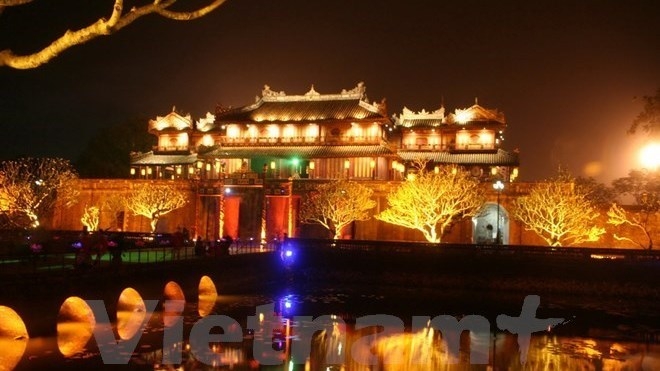
The flow of foreign tourists into the central province of Thua Thien-Hue increased by 31.29 percent to 1.07 million in the first nine months of 2017.

Hue imperial city by night
(Photo: VNA)
The
Republic of Korea ranked first in terms of the number of holidaymakers visiting
Thua Thien-Hue, making up 26 percent of the total number.
In the
reviewed period, the province served a total of 2.78 million visitors. The Hue
Relics Preservation Centre alone welcomed 2.4 million visitors, up 18.55 percent
from the same period last year.
In
September 2017, the provincial Department of Tourism and Traveloka Vietnam
Company signed a Memorandum of Understanding on tourism development, which aims
to connect accommodation establishments, airlines and potential customers.
The
locality also signed a cooperation agreement with the national flag carrier
Vietnam Airlines to promote Hue at domestic and foreign tourism trade fairs, in
addition to increasing flights and launching new routes to the imperial city.
In 2017,
Thua Thien-Hue province expects to attract over 3 million tourists, of which
international visitors will make up 40-45 percent, raking in more than VND3
trillion (US$131 million).
Hue, which
was the imperial capital of Vietnam for hundreds of years, is home to five
heritages recognised by UNESCO, which are the Hue ancient citadel relic complex
- a World Cultural Heritage site; Nha Nhac (Hue royal court music) - an
intangible cultural heritage item; Nguyen Dynasty’s wood blocks - a documentary
heritage item; Nguyen Dynasty’s Chau ban (royal administrative documents) -
part of the Asia-Pacific Register of UNESCO’s Memory of the World Programme;
and literature on Hue royal architecture - a documentary heritage.
The Hue
imperial citadel relic ranked second among the top seven tourism attractions of
Vietnam in 2017.
Source: NDO
Located just a 20-minute drive from Hoa Binh City, Ora Hill Farmstay & Glamping Hoa Binh is a captivating new destination nestled in Mo hamlet, Bình Thanh commune, Cao Phong district. Combining farming with leisure, this tranquil retreat is perfect for those seeking balance, joy, and an immersive experience in the expansive beauty of nature.
Muong Bi - Tan Lac is renowned as one of the four famous Muong regions in Hoa Binh province. Blessed by nature with a favourable climate and stunning landscapes, Tan Lac holds great advantages for tourism development. The local tourism industry has made remarkable strides in recent times thanks to the attention and support from the local authorities and sectors.
With its strategic location, well-developed transport network, and diverse soil and climatic conditions, Hoa Binh is emerging as a must-visit destination in Vietnam's northwestern tourism corridor. The province boasts numerous attractions, including the Kim Boi hot springs (Kim Boi district), the Dau Rong cave complex (Cao Phong), the Mai Chau valley (Mai Chau), and the iconic Hoa Binh hydropower plant.
The northern mountainous province of Hoa Binh has been listed among the 71 most beautiful places to visit worldwide by the prestigious US travel magazine Condé Nast Traveller.
Hoa Binh province’s rich natural and cultural resources position it as a prime location for developing community-based tourism (CBT). In recent years, support from central and provincial policies, as well as assistance from non-governmental organisations, have encouraged local ethnic minority and mountainous communities to actively engage in the sector.



